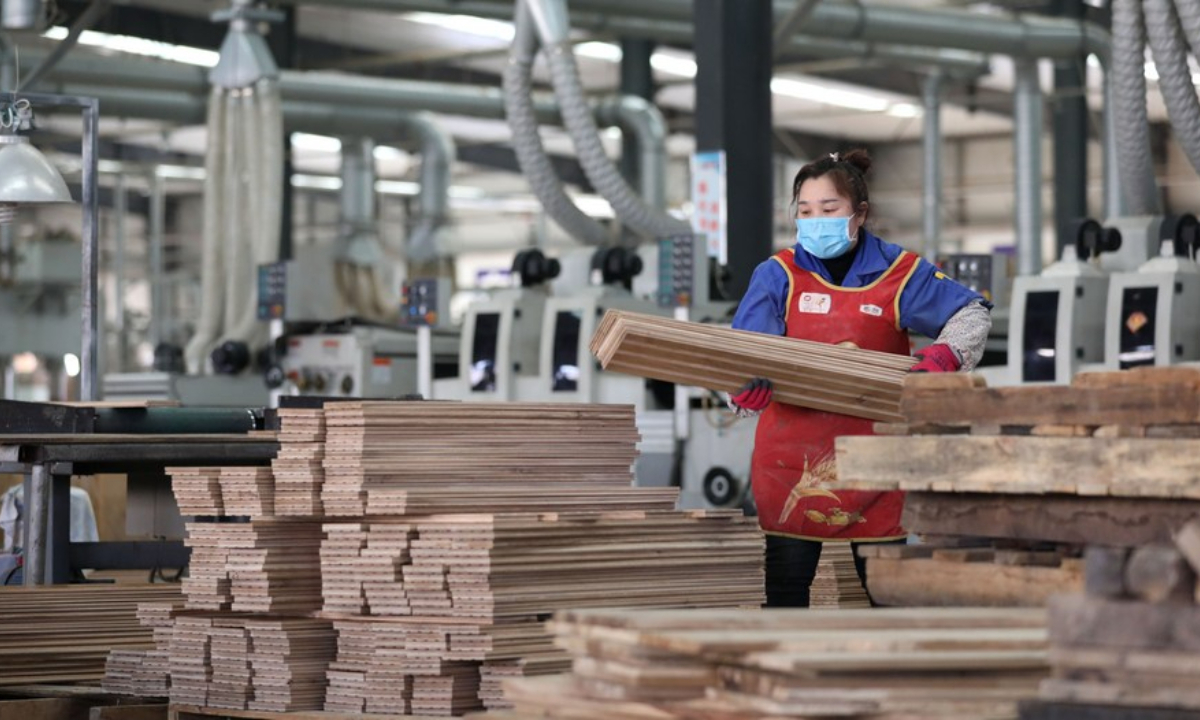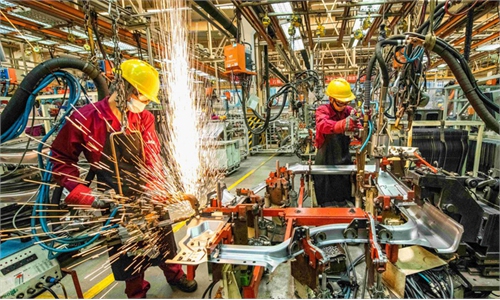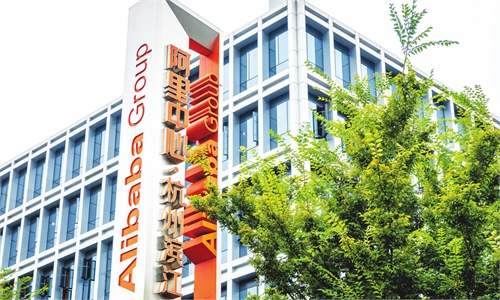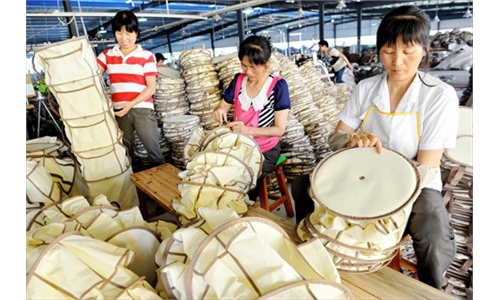
A worker arranges newly-produced floorboards at a factory in Benxi, northeast China's Liaoning Province, March 17, 2020. Photo:Xinhua
Multiple Chinese departments vowed to further enhance support for private enterprises, in a bid to help promote the healthy and high-quality development of the private economy, further boosting market confidence and consolidating the foundation of economic recovery.
The National Association of Financial Market Institution Investors held a meeting on private enterprise financing on Friday to listen to the opinions and suggestions of these enterprises on expanding the service scope of the bond financing support tool, known as the "second arrow," as well as better promoting the sustained and healthy development of private firms.
A total of 12 private companies including New Hope Group, Country Garden and TCL said during the meeting that since 2018, under the guidance of the People's Bank of China (PBC), the country's central bank, the association has supported the bond financing of private enterprises through the "second arrow," giving full play to the advantages of the bond market in terms of openness and transparency, and strong guidance of expectations, releasing positive and clear signals, effectively boosting the market's expectations and confidence, and driving the resumption of smooth financing channels for private enterprises.
In particular, since November last year, the "second arrow" policy has been extended and expanded to actively support bond financing for private real estate enterprises, which has played an important role in maintaining the stability of bond financing for these firms.
The association said that in the future, it will continuously support bond financing for private real estate and industrial enterprises to help the private economy develop with high quality in a healthy way.
On the same day, the PBC released data about the financing situation of micro and private enterprises in the first half of the year during a press conference.
At the end of June, the balance of inclusive loans for small and micro enterprises reached 27.7 trillion yuan ($3.88 trillion), up 26 percent year-on-year. The number of credit-granting households of the inclusive loans totaled 59.35 million, an increase of 13.3 percent compared with the previous year.
The central bank said that it will continue to provide financial support to small and micro enterprises and private firms. It will promote the use of inclusive loans as a support tool for micro and small businesses and guide financial institutions to increase lending to these companies.
However, as the country has encountered some challenges during its economic recovery, some Western media alleged that a lack of private investment dragged down China's economy. According to a report from Reuters, the IMF said on Thursday that China's economy is slowing due to weaker private investment, slowing exports and reducing domestic demand.
"The decline in private investment is a combination of structural and cyclical factors. This year, Chinese enterprises entered a de-stocking cycle, coupled with the fact that demand has not yet fully recovered, but I think it is a short-term phenomenon," Hu Qimu, deputy secretary general of the digital real economies integration Forum 50, told the Global Times on Friday.
Hu noted that in the first half of this year, the private economy has seen continuous recovery, which can be reflected in the country's foreign trade data from January to June released on Thursday.
According to data from the General Administration of Customs, Chinese private enterprises have become the main force for steady growth in foreign trade. Their import and export value reached 10.59 trillion yuan in the first half of the year, an increase of 8.9 percent year-on-year, pulling China's foreign trade growth up by 4.4 percentage points.
Imports of livelihood and resource products also saw rapid growth. The value of imports of agricultural products by private enterprises rose 21.9 percent, and those of pharmaceutical materials and medicines increased 24.8 percent.
"The excellent performance of the private enterprises in foreign trade showed the rapid recovery of the country's private economy and consumption market," Hu noted.
Chinese authorities have stepped up their efforts to boost the healthy development of platform economies and the country's private sector.
Chinese Premier Li Qiang presided over a meeting with platform operators including Alibaba, Douyin and Xiaohongshu on Wednesday, and called on relevant authorities at all levels to create a fair and competitive market environment, along with improved policies, and establish a sound, transparent and predictable regulatory system for normalized regulation.
The National Development and Reform Commission, the country's top economic planner, vowed further support for platform operators to play a more active role in driving the economic recovery, creating more jobs and growing stronger in international competition.
"The recent actions of Chinese authorities could inject confidence into platform firms and the whole private sector, stabilizing market expectations," Hu noted.
Global Times



